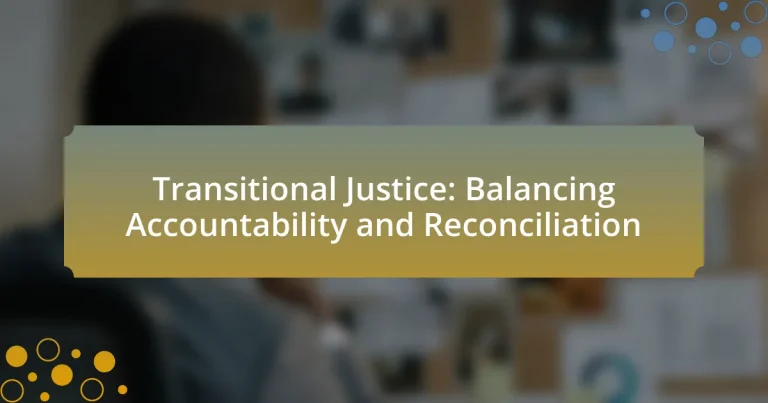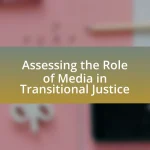Transitional justice refers to the judicial and non-judicial measures implemented by countries to address human rights abuses and promote accountability, reconciliation, and the rule of law. Key mechanisms include truth commissions, criminal prosecutions, reparations programs, and institutional reforms, all aimed at acknowledging past injustices and fostering societal healing. The article explores the principles of transitional justice, its importance in post-conflict societies, and the challenges faced in its implementation, including political resistance and societal divisions. It also discusses the balance between accountability and reconciliation, emphasizing the role of community involvement and education in enhancing transitional justice outcomes.
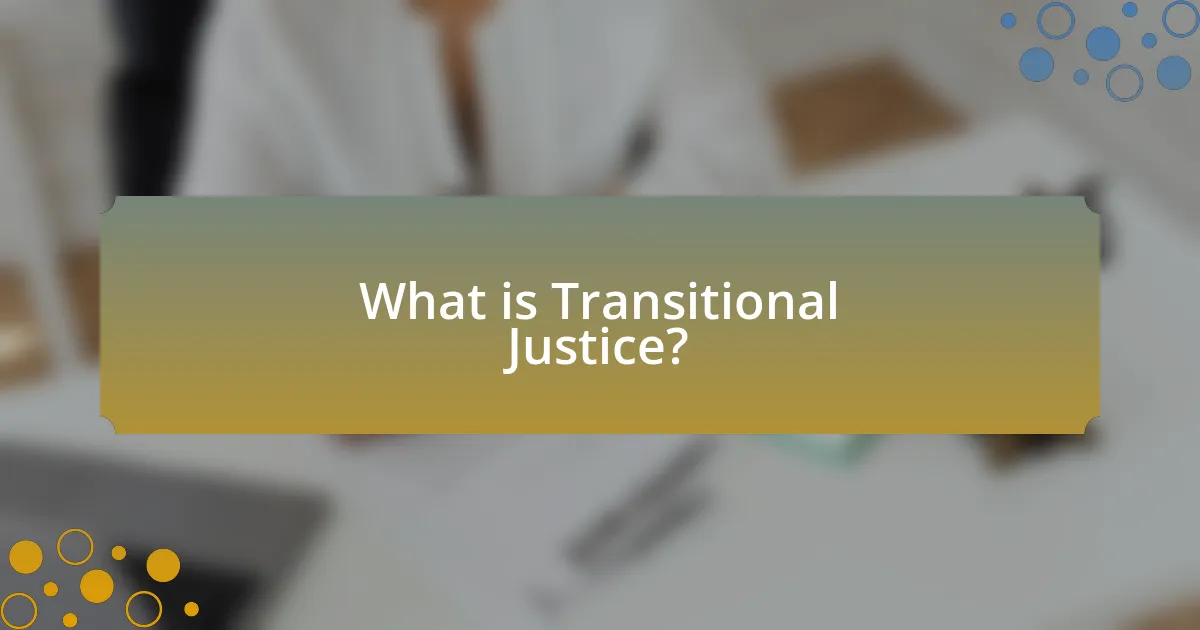
What is Transitional Justice?
Transitional justice refers to the set of judicial and non-judicial measures implemented by countries to address legacies of human rights abuses and promote accountability, reconciliation, and the rule of law. These measures can include criminal prosecutions, truth commissions, reparations programs, and institutional reforms aimed at preventing future violations. Historical examples, such as South Africa’s Truth and Reconciliation Commission, illustrate how transitional justice can facilitate societal healing and foster democratic governance after periods of conflict or authoritarian rule.
How does Transitional Justice aim to address past injustices?
Transitional Justice aims to address past injustices by implementing mechanisms that promote accountability, truth-telling, reparations, and institutional reform. These mechanisms are designed to acknowledge and rectify the harms caused by systemic violations of human rights during periods of conflict or authoritarian rule. For instance, truth commissions, such as South Africa’s Truth and Reconciliation Commission, have been established to uncover the truth about past atrocities, allowing victims to share their experiences and fostering societal healing. Additionally, legal prosecutions of perpetrators, as seen in the International Criminal Court’s actions, serve to hold individuals accountable for their crimes, thereby reinforcing the rule of law. Furthermore, reparations programs provide compensation to victims, addressing their suffering and aiding in their recovery. Collectively, these approaches aim to create a foundation for sustainable peace and democracy by ensuring that past injustices are recognized and addressed.
What are the key principles of Transitional Justice?
The key principles of Transitional Justice include accountability, truth-seeking, reparations, and institutional reform. Accountability ensures that perpetrators of human rights violations are held responsible, which is essential for justice and deterrence. Truth-seeking involves uncovering the facts about past abuses, often through truth commissions, to promote understanding and acknowledgment of victims’ experiences. Reparations provide compensation and recognition to victims, addressing the harm they suffered and facilitating healing. Institutional reform aims to transform state institutions to prevent future abuses, ensuring that justice systems are fair and effective. These principles collectively support the goals of promoting justice, reconciliation, and the rule of law in post-conflict societies.
How does Transitional Justice differ from traditional justice systems?
Transitional Justice differs from traditional justice systems primarily in its focus on addressing past human rights violations and fostering societal reconciliation rather than solely punishing offenders. Traditional justice systems typically emphasize retribution and legal accountability for crimes, often operating within established legal frameworks. In contrast, Transitional Justice seeks to provide a holistic approach that includes truth-telling, reparations, and institutional reforms, aiming to heal communities and prevent future atrocities. For example, countries like South Africa implemented Truth and Reconciliation Commissions to uncover the truth about apartheid-era abuses, demonstrating a commitment to restorative justice rather than mere punishment. This approach highlights the importance of societal healing and the acknowledgment of victims’ experiences, which is often absent in traditional justice systems.
Why is Transitional Justice important in post-conflict societies?
Transitional Justice is important in post-conflict societies because it addresses the legacies of human rights violations and fosters reconciliation. By implementing mechanisms such as truth commissions, reparations, and criminal prosecutions, Transitional Justice aims to hold perpetrators accountable while acknowledging the suffering of victims. For instance, the Truth and Reconciliation Commission in South Africa played a crucial role in healing the nation after apartheid by uncovering the truth about past atrocities and promoting national unity. This process not only helps to restore dignity to victims but also contributes to the establishment of the rule of law and the prevention of future conflicts.
What role does Transitional Justice play in healing communities?
Transitional Justice plays a crucial role in healing communities by addressing past human rights violations and fostering accountability. It facilitates truth-telling, reparations, and institutional reforms, which help restore trust among community members and between citizens and the state. For instance, the Truth and Reconciliation Commission in South Africa provided a platform for victims to share their experiences, contributing to national healing and social cohesion. Studies show that communities engaged in transitional justice processes report higher levels of trust and lower levels of violence, indicating its effectiveness in promoting reconciliation and healing.
How does Transitional Justice contribute to the rule of law?
Transitional Justice contributes to the rule of law by establishing accountability for past human rights violations and promoting legal reforms that strengthen judicial systems. By addressing grievances through mechanisms such as truth commissions, trials, and reparations, Transitional Justice fosters public trust in legal institutions. For instance, the establishment of the International Criminal Court has reinforced the principle that individuals can be held accountable for war crimes, thereby enhancing the rule of law globally. Additionally, countries like South Africa, through its Truth and Reconciliation Commission, demonstrated how legal processes can facilitate societal healing while reinforcing the importance of justice and rule of law in post-conflict settings.
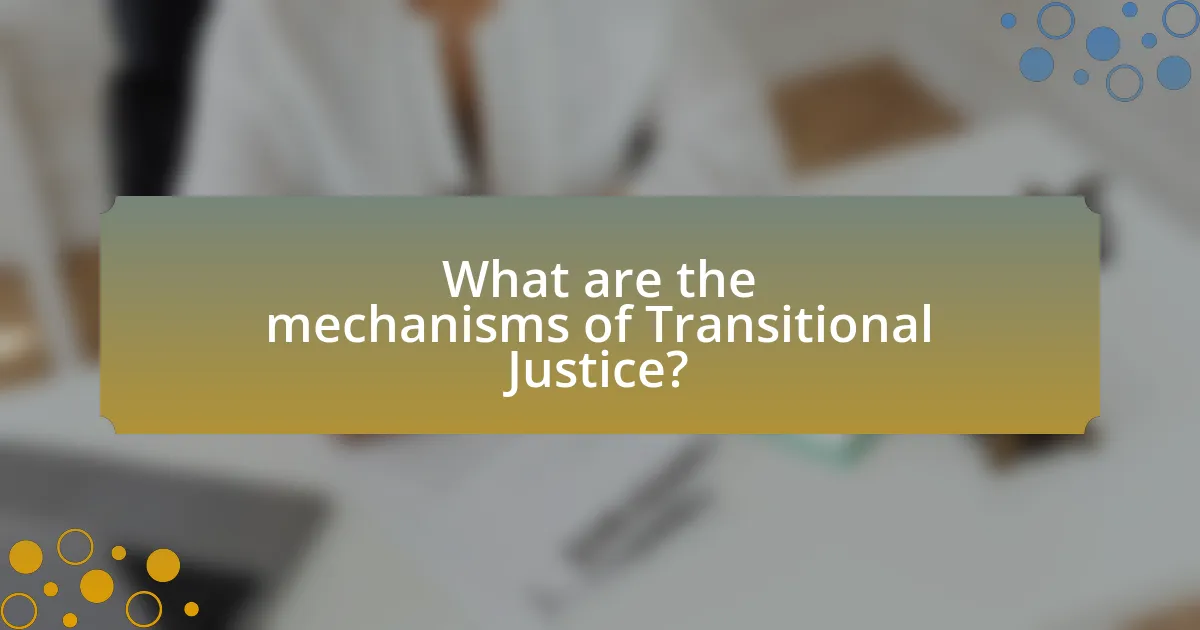
What are the mechanisms of Transitional Justice?
Transitional justice mechanisms include truth commissions, criminal prosecutions, reparations programs, and institutional reforms. Truth commissions, such as South Africa’s Truth and Reconciliation Commission, aim to uncover past human rights violations and promote healing. Criminal prosecutions hold perpetrators accountable, exemplified by the International Criminal Court’s role in prosecuting war crimes. Reparations programs provide compensation to victims, as seen in various countries post-conflict. Institutional reforms focus on restructuring governmental and legal systems to prevent future abuses, demonstrated by reforms in post-dictatorship Latin American countries. These mechanisms collectively address the legacies of conflict and promote societal healing.
What types of mechanisms are commonly used in Transitional Justice?
Transitional justice commonly employs mechanisms such as truth commissions, criminal prosecutions, reparations programs, and institutional reforms. Truth commissions, like South Africa’s Truth and Reconciliation Commission, aim to uncover past human rights violations and promote healing. Criminal prosecutions hold perpetrators accountable, exemplified by the International Criminal Court’s efforts to prosecute war crimes. Reparations programs provide compensation to victims, as seen in various countries post-conflict. Institutional reforms focus on restructuring government and security institutions to prevent future abuses, which is crucial for sustainable peace. These mechanisms collectively address the legacies of conflict and promote societal healing.
How do truth commissions function in Transitional Justice?
Truth commissions function in Transitional Justice by investigating and documenting human rights violations that occurred during periods of conflict or authoritarian rule. These commissions aim to uncover the truth about past atrocities, promote accountability, and facilitate reconciliation among affected communities. For example, the South African Truth and Reconciliation Commission, established in 1995, provided a platform for victims to share their experiences and for perpetrators to confess their crimes, thereby fostering a collective understanding of the past. This process not only helps to validate the experiences of victims but also contributes to the establishment of a historical record that can inform future policies and prevent recurrence of violence.
What is the role of reparations in Transitional Justice processes?
Reparations play a crucial role in Transitional Justice processes by addressing the harm suffered by victims of human rights violations. They serve to acknowledge the suffering of individuals and communities, promote healing, and restore dignity. Reparations can take various forms, including financial compensation, restitution of property, and public acknowledgment of wrongdoing. For instance, the Truth and Reconciliation Commission in South Africa emphasized reparations as a means to foster national healing after apartheid, highlighting their importance in rebuilding trust and social cohesion. By providing reparations, states can demonstrate accountability and commitment to justice, which is essential for long-term peace and stability in post-conflict societies.
How do trials and prosecutions fit into Transitional Justice?
Trials and prosecutions are essential components of Transitional Justice as they aim to hold perpetrators accountable for human rights violations and promote justice in post-conflict societies. These legal processes serve to establish the truth about past atrocities, provide a sense of closure to victims, and deter future violations by reinforcing the rule of law. Historical examples, such as the Nuremberg Trials following World War II and the International Criminal Tribunal for the former Yugoslavia, illustrate how trials can contribute to societal healing and the establishment of a historical record, thereby fostering reconciliation while addressing the need for accountability.
What challenges are faced in prosecuting war crimes?
Prosecuting war crimes faces significant challenges, including issues of jurisdiction, gathering evidence, and political will. Jurisdictional challenges arise when crimes occur in conflict zones where international law may be difficult to enforce, as seen in the cases of Syria and Libya, where national courts are often unable or unwilling to prosecute. Evidence gathering is complicated by the chaotic nature of war, making it hard to obtain reliable testimonies and documentation, as highlighted by the International Criminal Court’s struggles in collecting evidence from conflict areas. Additionally, political will is often lacking, as governments may resist accountability for their actions or those of their allies, undermining efforts to bring perpetrators to justice, exemplified by the reluctance of some states to cooperate with international tribunals.
How do international tribunals differ from national courts in Transitional Justice?
International tribunals differ from national courts in Transitional Justice primarily in their jurisdiction and scope. International tribunals, such as the International Criminal Court, address crimes that have a global impact, including genocide and war crimes, and operate under international law, which allows them to prosecute individuals regardless of national boundaries. In contrast, national courts focus on domestic laws and typically handle crimes within their own jurisdictions, often influenced by local political contexts and legal frameworks. This distinction is significant as international tribunals aim to uphold universal standards of justice and accountability, while national courts may prioritize reconciliation and stability, sometimes leading to impunity for perpetrators of serious crimes.
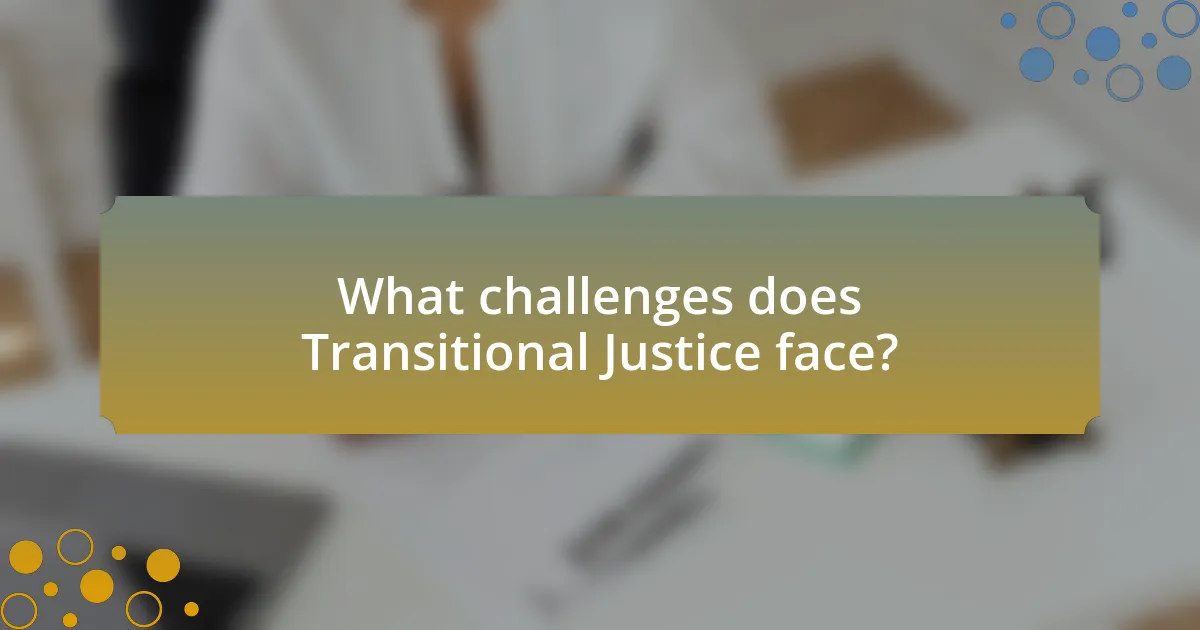
What challenges does Transitional Justice face?
Transitional Justice faces several significant challenges, including political resistance, lack of resources, and societal divisions. Political resistance often arises from those in power who may fear accountability for past actions, undermining efforts to implement justice mechanisms. Additionally, limited financial and institutional resources can hinder the establishment and effectiveness of transitional justice processes, as seen in countries like South Sudan, where ongoing conflict complicates justice initiatives. Societal divisions, often rooted in ethnic or political lines, can impede reconciliation efforts, as communities may struggle to engage in dialogue or trust-building activities necessary for healing. These challenges collectively impact the ability of transitional justice to achieve its goals of accountability and reconciliation.
What are the common obstacles to implementing Transitional Justice?
Common obstacles to implementing Transitional Justice include political resistance, lack of resources, and societal divisions. Political resistance often arises from those in power who fear accountability for past actions, as seen in countries like Sudan, where leaders have obstructed justice processes. Lack of resources can hinder the establishment of effective mechanisms, such as truth commissions or reparations programs, which require funding and trained personnel. Societal divisions, often exacerbated by past conflicts, can lead to a lack of public support for Transitional Justice initiatives, making it difficult to achieve consensus on the need for accountability and reconciliation. These factors collectively impede the successful implementation of Transitional Justice frameworks.
How do political dynamics affect Transitional Justice initiatives?
Political dynamics significantly influence Transitional Justice initiatives by shaping the willingness of political actors to engage in accountability measures and reconciliation processes. For instance, in post-conflict societies, the balance of power among political factions can determine whether justice mechanisms, such as truth commissions or trials, are implemented or obstructed. In countries like South Africa, the political transition from apartheid to democracy facilitated the establishment of the Truth and Reconciliation Commission, demonstrating how favorable political conditions can promote justice initiatives. Conversely, in contexts where political elites resist accountability, such as in Syria, ongoing conflict and authoritarian governance hinder the establishment of effective Transitional Justice mechanisms, illustrating the critical role of political dynamics in either advancing or impeding these initiatives.
What impact does societal division have on Transitional Justice efforts?
Societal division significantly hampers Transitional Justice efforts by creating an environment of mistrust and hostility among different groups. This division often leads to competing narratives about past injustices, making it difficult to establish a common understanding necessary for reconciliation. For instance, in post-apartheid South Africa, the deep racial and socio-economic divides complicated the Truth and Reconciliation Commission’s work, as various groups had differing perspectives on justice and accountability. Such divisions can result in a lack of participation in transitional processes, undermining their legitimacy and effectiveness.
How can Transitional Justice be effectively balanced with reconciliation?
Transitional Justice can be effectively balanced with reconciliation by integrating accountability measures that promote healing and societal trust. This balance is achieved through mechanisms such as truth commissions, which allow victims to share their experiences while holding perpetrators accountable, fostering a collective understanding of past injustices. For instance, the South African Truth and Reconciliation Commission successfully combined accountability with reconciliation by offering amnesty to those who fully disclosed their involvement in human rights violations, thereby encouraging open dialogue and healing within the society. This approach demonstrates that when victims feel heard and justice is pursued, it can lead to a more cohesive society, ultimately enhancing the reconciliation process.
What strategies promote both accountability and reconciliation?
Strategies that promote both accountability and reconciliation include truth commissions, restorative justice practices, and legal prosecutions. Truth commissions, such as South Africa’s Truth and Reconciliation Commission, facilitate open dialogue about past atrocities, allowing victims to share their experiences while holding perpetrators accountable. Restorative justice practices focus on repairing harm through mediation and dialogue, fostering understanding and healing between victims and offenders. Legal prosecutions, as seen in the International Criminal Court, ensure that individuals responsible for serious crimes face justice, reinforcing the rule of law and deterring future violations. These strategies collectively contribute to a society’s healing process while ensuring that accountability is maintained.
How can community involvement enhance Transitional Justice outcomes?
Community involvement can enhance Transitional Justice outcomes by fostering local ownership and trust in the processes. When communities actively participate in Transitional Justice initiatives, they contribute to a more inclusive dialogue that reflects their specific needs and experiences, which can lead to more effective and accepted resolutions. For instance, research by the International Center for Transitional Justice indicates that community engagement in truth commissions often results in higher levels of satisfaction with the outcomes, as it allows for diverse perspectives to be heard and integrated into the justice process. This participatory approach not only strengthens the legitimacy of the Transitional Justice mechanisms but also promotes healing and reconciliation within the community, ultimately leading to more sustainable peace.
What best practices can be adopted in Transitional Justice processes?
Best practices in Transitional Justice processes include ensuring victim participation, promoting truth-telling, and establishing accountability mechanisms. Victim participation is crucial as it empowers affected individuals and communities, fostering a sense of ownership in the process. Truth-telling initiatives, such as truth commissions, help uncover the facts of past abuses, contributing to collective memory and historical record. Accountability mechanisms, including trials and reparations, serve to hold perpetrators responsible and provide justice to victims, which is essential for rebuilding trust in institutions. These practices are supported by various case studies, such as the South African Truth and Reconciliation Commission, which demonstrated the importance of inclusive dialogue and acknowledgment of past wrongs in achieving societal healing.
How can lessons learned from past Transitional Justice efforts inform future practices?
Lessons learned from past Transitional Justice efforts can inform future practices by highlighting the importance of context-specific approaches and the need for inclusive participation. Historical examples, such as South Africa’s Truth and Reconciliation Commission, demonstrate that engaging diverse stakeholders fosters legitimacy and public trust, which are crucial for successful outcomes. Additionally, the experiences from countries like Rwanda reveal that addressing victims’ needs and ensuring accountability can enhance societal healing and prevent future conflicts. These insights underscore the necessity of tailoring strategies to local realities while prioritizing both accountability and reconciliation to achieve sustainable peace.
What role does education play in supporting Transitional Justice initiatives?
Education plays a crucial role in supporting Transitional Justice initiatives by fostering awareness, understanding, and engagement among communities affected by conflict or repression. It equips individuals with the knowledge of their rights and the mechanisms available for seeking justice, thereby promoting active participation in the transitional process. For instance, educational programs that focus on human rights, historical context, and the importance of accountability can empower victims and marginalized groups to advocate for their needs and contribute to societal healing. Research indicates that countries with robust educational frameworks addressing transitional justice issues tend to experience more effective reconciliation processes, as seen in post-apartheid South Africa, where educational initiatives helped bridge divides and promote dialogue.
